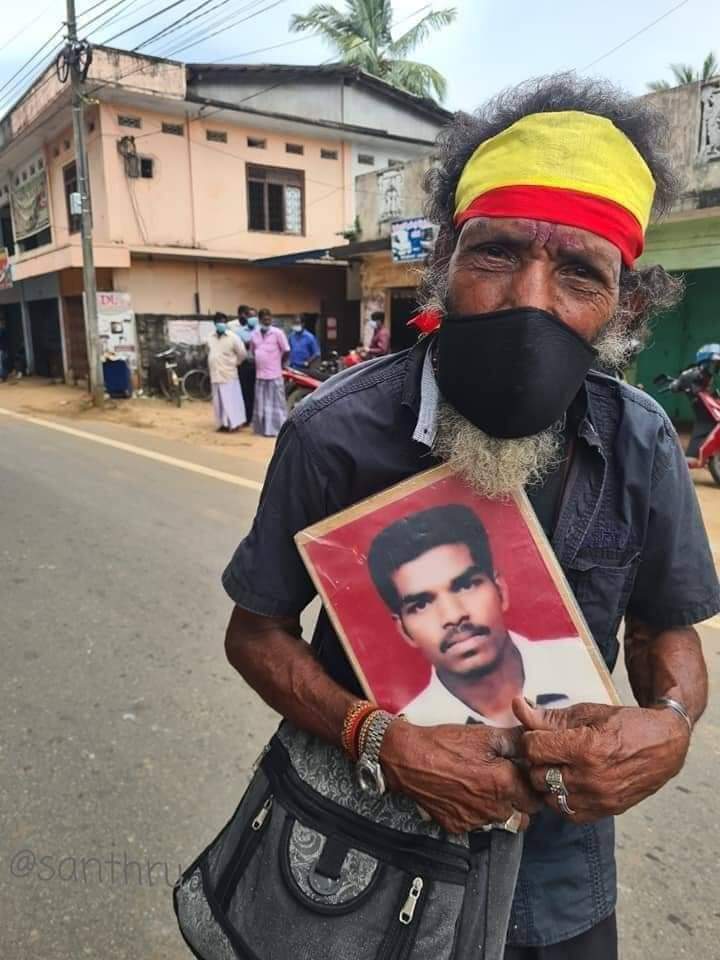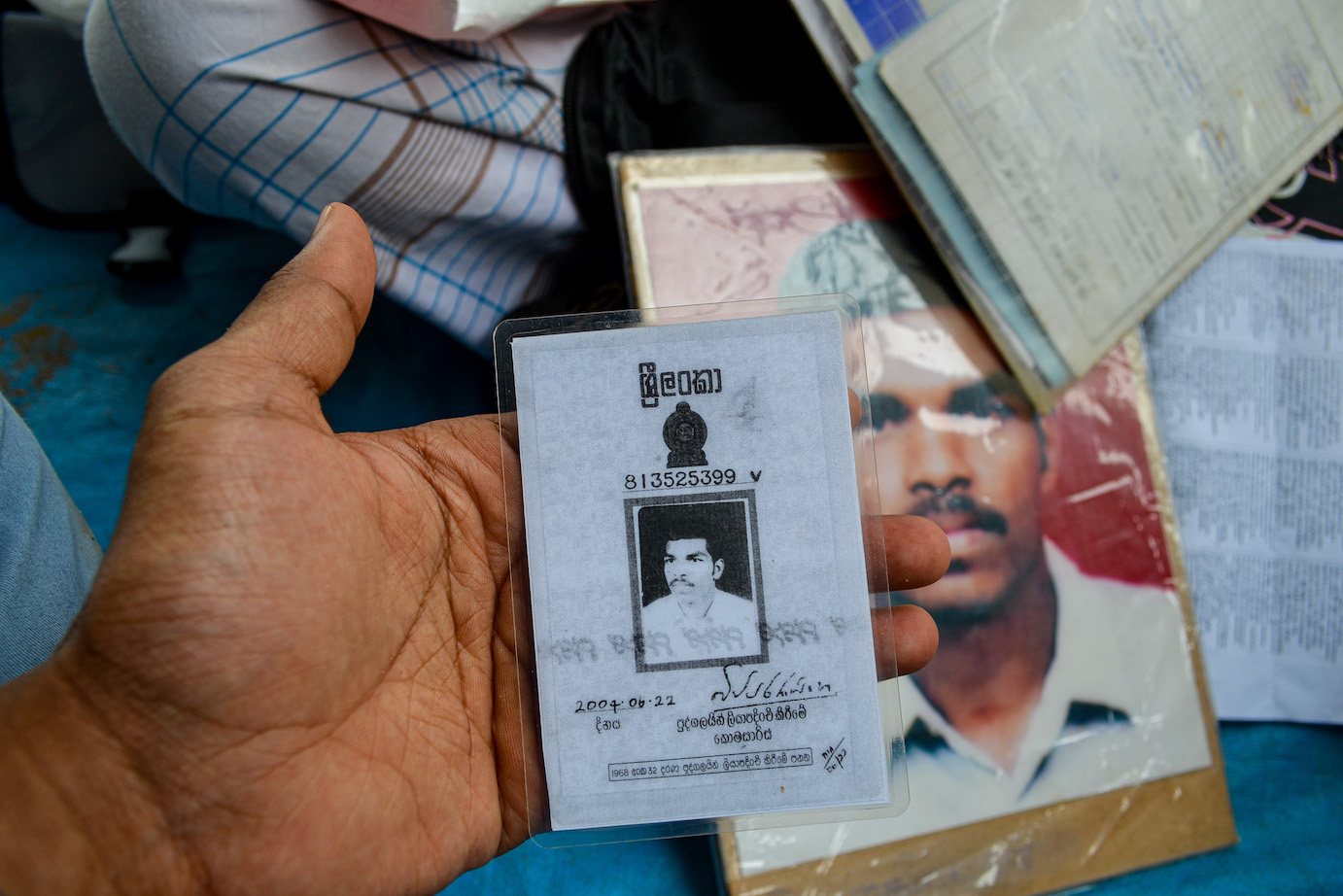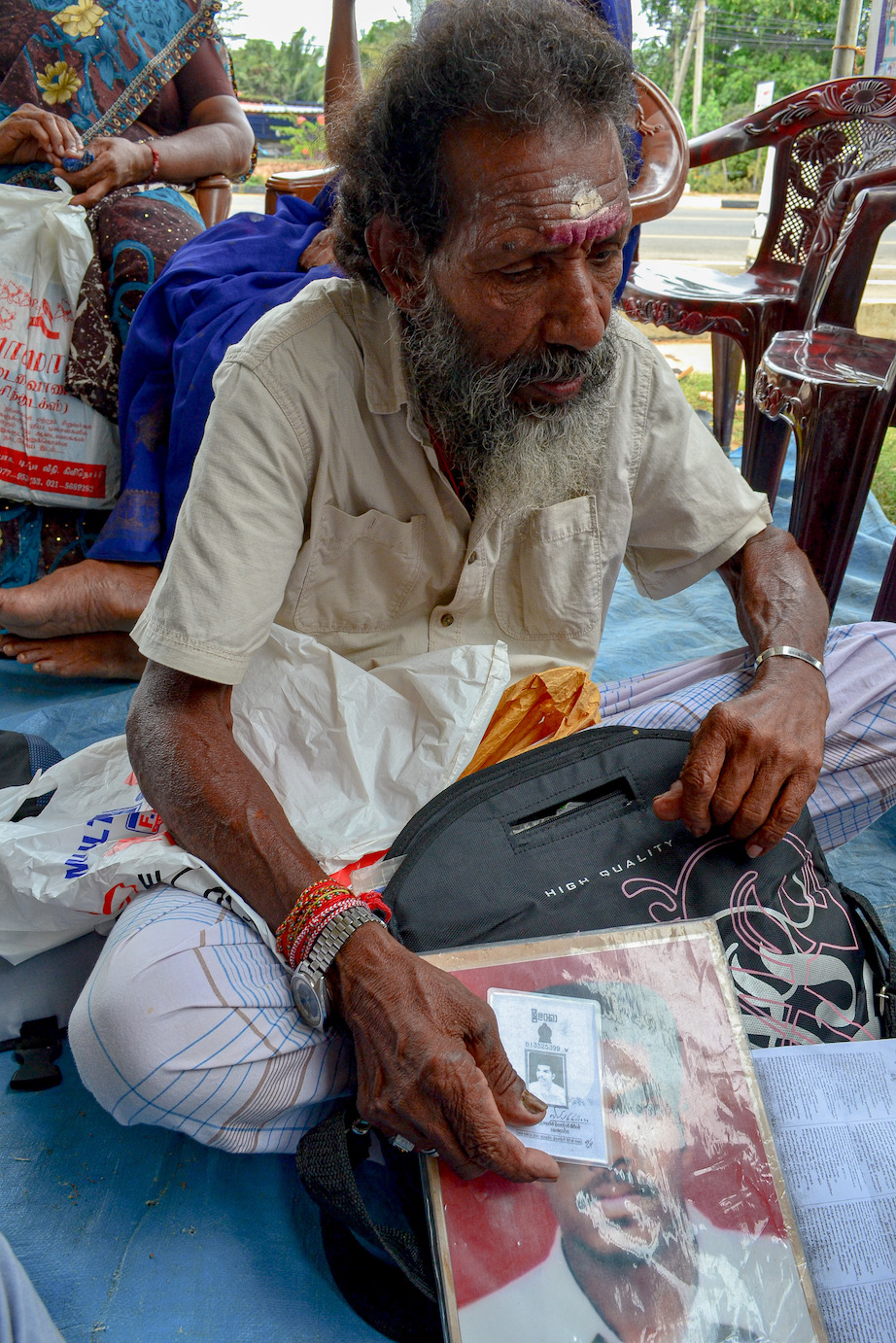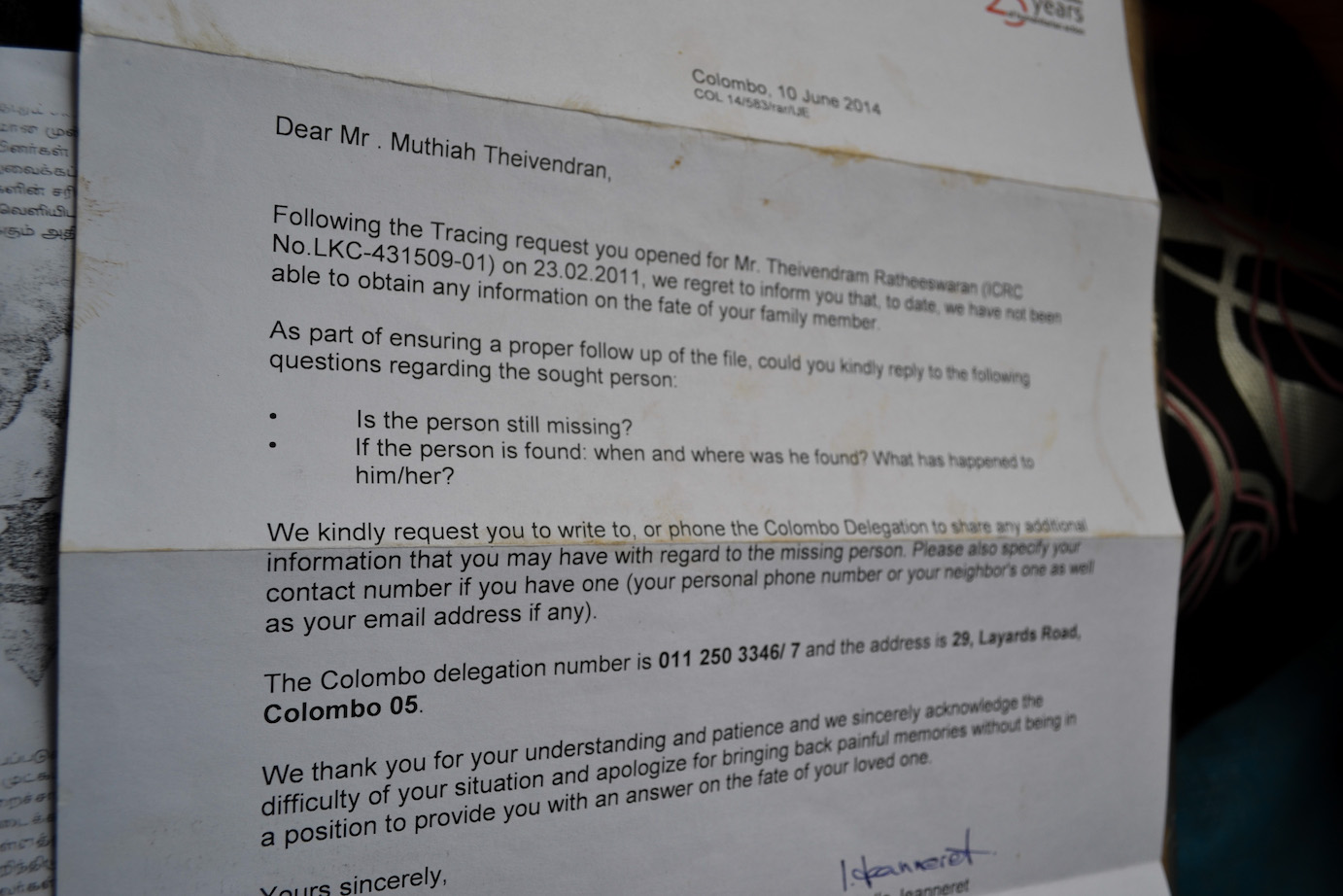Last week, photographs of Muthiah Theivendran, a Tamil father searching for his forcibly disappeared son, went viral across social media.
Muthiah was part of the tens of thousands of Tamil protestors who rallied across the North-East earlier this month, during the Pottuvil to Polikandy demonstration. But it wasn’t the image of him marching alongside the masses that caught the attention of social media users. Instead, it was a photograph of the elderly, bearded gentleman, cutting a desolate figure, as he walked barefoot and alone after the protest had ended.
He was still wearing his mask, his red and yellow headband from the protest and still clutching a photograph of his disappeared son.
-பிரதிசெய்யப்பட்டது-
இந்த முதியவரின் புகைப்படம் பகிரப்படுவதால் அதனை எடுத்தவன் என்ற ரீதியில் இந்த புகைப்படம் எடுக்கப்பட்ட அந்தத்தருணத்தை பகிர்கிறேன் .
இந்த முதியவர் ஏதோ ஒரு இறுதி நம்பிக்கையில் சலசலப்புகளில் இருந்து விலகி ஓரமாக தன் மகனின் படத்துடன் வந்தார் pic.twitter.com/jkdVzWdpfN— சகா(@sagaaJaffna) February 9, 2021
Santhru, the photographer who captured the images, described how he spotted the gentleman after the protest, and asked him whether he came by motorcycle. “No, rasa,” Muthiah had replied, using a term of endearment usually used with sons. He said that he was on foot because he wasn't feeling well and would board a vehicle later. Santhru tweeted about the poignancy he felt when the man called him 'rasa'.
"The big crowds don't mean that much to him, not even the commotion,” he added. “He trudges on quietly with some hope."
The Tamil Guardian team first met Muthiah in May 2017, just weeks after families of the disappeared launched their protests on the roadsides of the North-East. We conducted a series of interviews with the relatives, mainly women, who were staging their demonstration from a tarpaulin tent under the shadow of the Kandasamy temple in Kilinochchi.
As we sat cross-legged on the floor beside them, we recorded their heart-breaking testimonies. Some described how they had spent years searching for their children, writing to dozens of government officials and appearing before countless commissions. Others were furious, demanding answers from the Sri Lankan state and the international community as to the whereabouts of their loved ones. All of us shed tears as these courageous men and women described the struggles they had been through.
Muthiah had shown us years’ worth of documents that he had compiled and kept safe, from newspaper clippings where he thought he has spotted his son in a photograph to a 2014 response from the International Committee of the Red Cross, informing him “we have not been able to obtain any information on the fate of your family member”.
“Is the person still missing?” the ICRC asked. “If the person is found: What has happened to him/her?”
This week will mark 4 years since the protests started. Since they began, more than 78 of those parents have died, without ever finding out what happened to their disappeared children.
The testimonies that the families gave to us are details that they have since recalled dozens, if not hundreds of times, now. Pledges from various governments and politicians have all been broken. Mechanisms such as the 'Office of Missing Persons', which was hailed internationally, but treated with scepticism locally, have all but entirely collapsed. The thousands of disappeared men, women and children remain unaccounted for. The family members searching for them are tired and frustrated. They deserve answers.
Muthiah was 66-years-old when we interviewed him. At the time his wife had stopped coming to the protests. “She is also sick,” he told us. “Sick from thinking about our son.” They both still hold out hope he will be returned to them.
“I’m waiting for my son,” he pleaded, clasping his hands together in prayer. “You can take me and bring back my son, I’m begging you. You don’t need to do anything else for me. Bring back my son and take me instead.”
“I beg you.”
_____
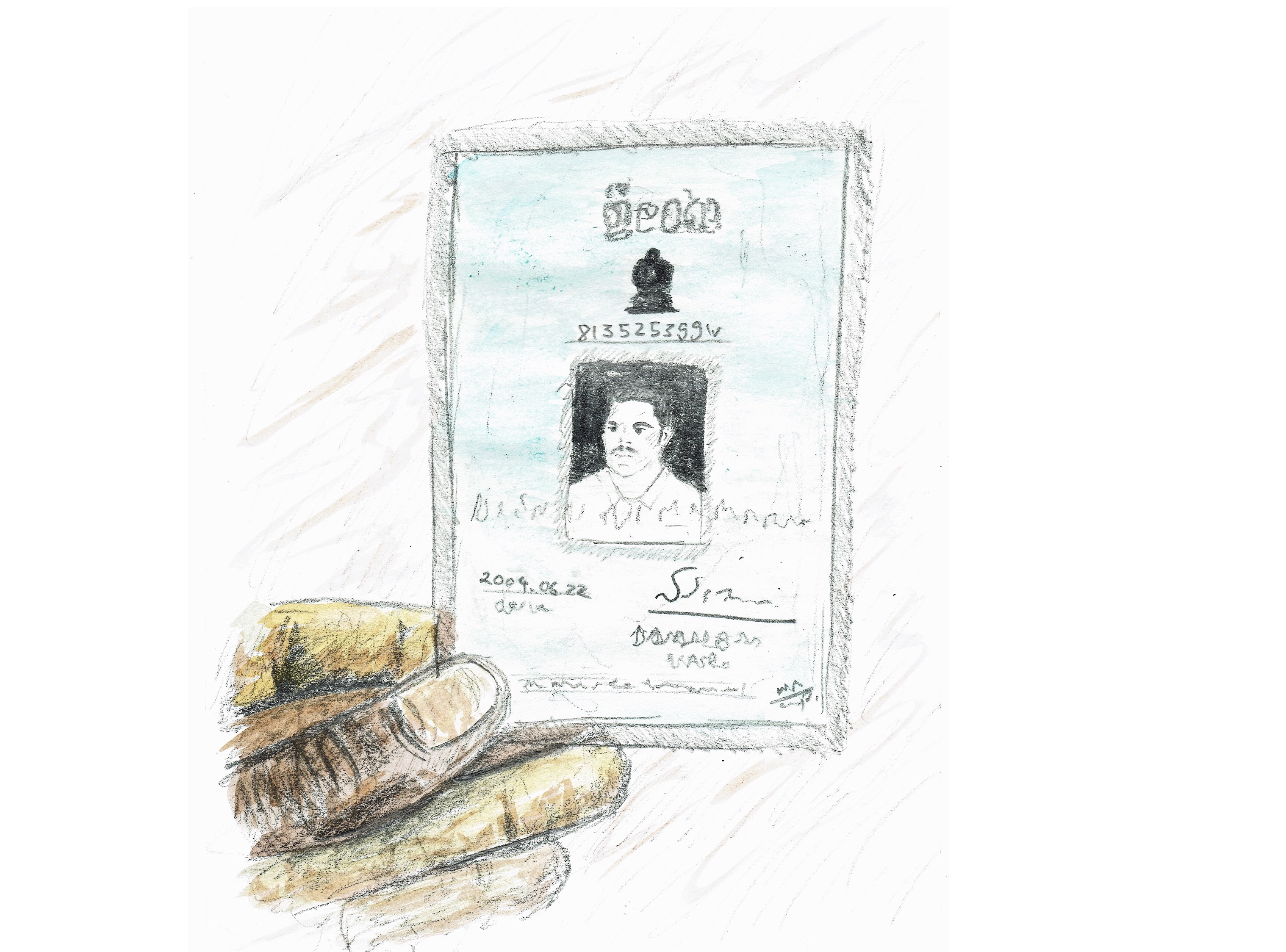
Read Muthiah's testimony here: Behind the protest - Families of the disappeared: Ratheeswaran
Artwork courtesy of Sagi Thilipkumar (@saygi)
_____
Read more testimonies below:
19 August 2018: Behind the protest - Families of the disappeared: Sivasothy
29 July 2018: Behind the protest – Kirishnakumari, Nadesu, Sarujan, Abitha and Ravichandran
09 July 2018: Behind the protest - Families of the disappeared: Mariyathas
30 October 2017: Behind the protest - Families of the disappeared: Selvan
26 August 2017: Behind the protest - Families of the disappeared: Abirami
We need your support
Sri Lanka is one of the most dangerous places in the world to be a journalist. Tamil journalists are particularly at threat, with at least 41 media workers known to have been killed by the Sri Lankan state or its paramilitaries during and after the armed conflict.
Despite the risks, our team on the ground remain committed to providing detailed and accurate reporting of developments in the Tamil homeland, across the island and around the world, as well as providing expert analysis and insight from the Tamil point of view
We need your support in keeping our journalism going. Support our work today.
For more ways to donate visit https://donate.tamilguardian.com.

